134 CD / Franz Schubert: Fantasia in F minor D940, Sonata „Gran Duo“ D812
Description
First here is the good news for all Evgeni Koroliov fans: Koroliov also plays in a piano duet, with his wife Ljupka Hadzigeorgieva; and not just since yesterday. He has been doing so for the last thirty (!) years. When TACET released the first solo recording by Evgeni Koroliov in 1990 (TACET 13 The Art of Fugue), a disc which composer György Ligeti was later to comment on, saying that it was the only one he would like to have with him on a desert island – many people wondered why they had not heard about this pianist before. In a strange way a similar thing has happened with the Koroliov piano duo. Here, yet again - with the exception of a special recording with a quite unusual repertoire – TACET is releasing the first recording by the Koroliov Duo. The fact that these two pianists are going public thirty years after beginning their joint career may seem puzzling, but says a lot about the seriousness with which they have approached these great works by Franz Schubert.
7 reviews for 134 CD / Franz Schubert: Fantasia in F minor D940, Sonata „Gran Duo“ D812
You must be logged in to post a review.

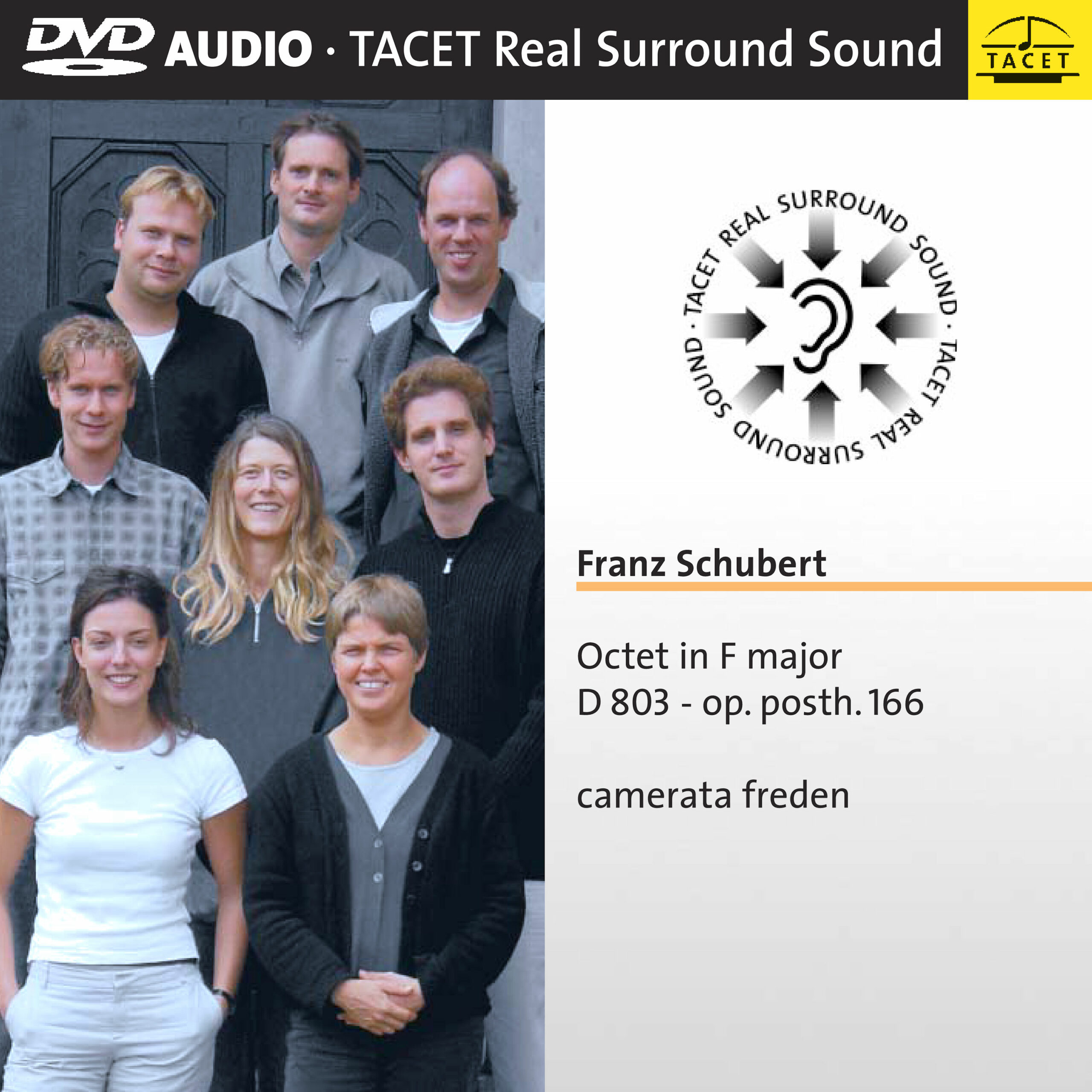
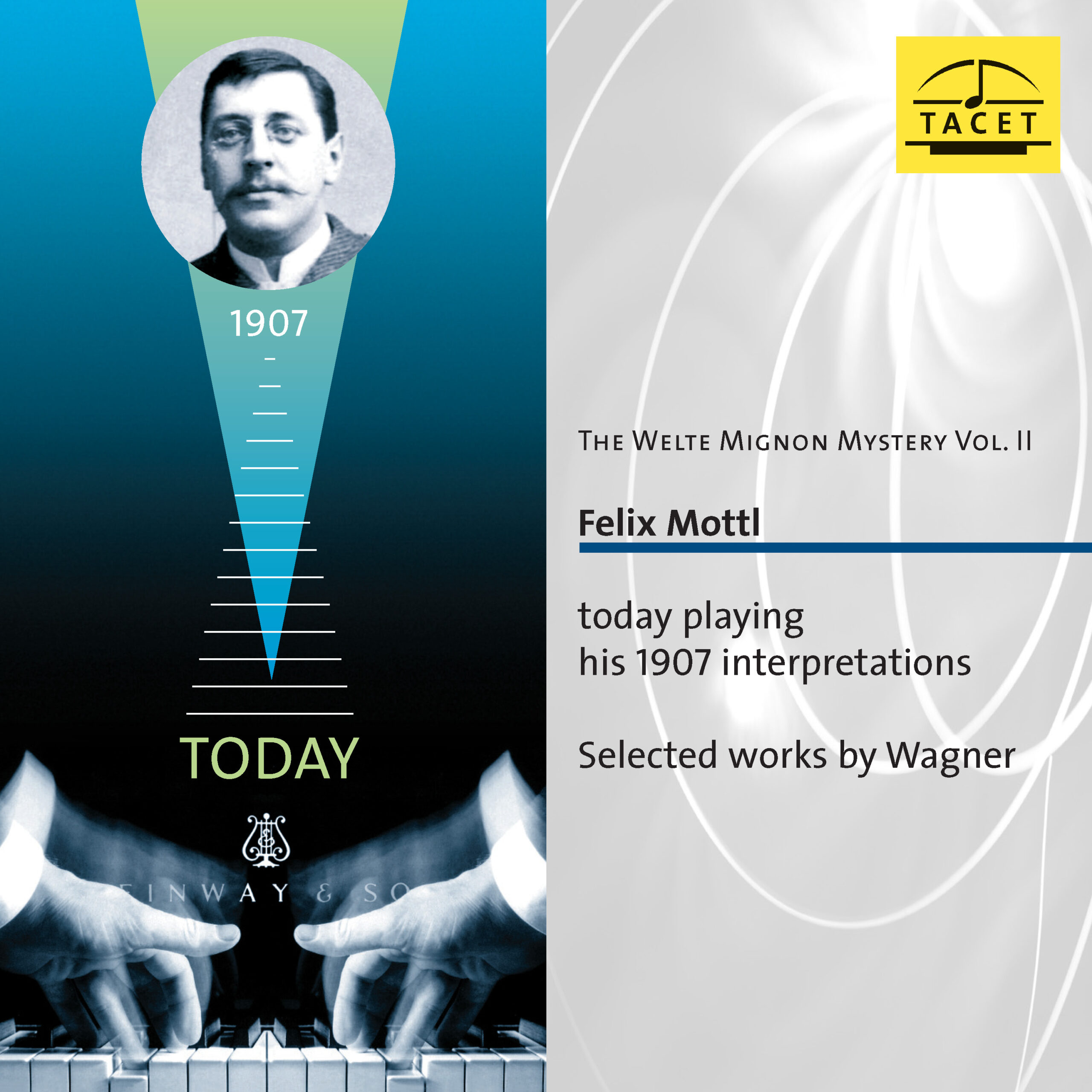
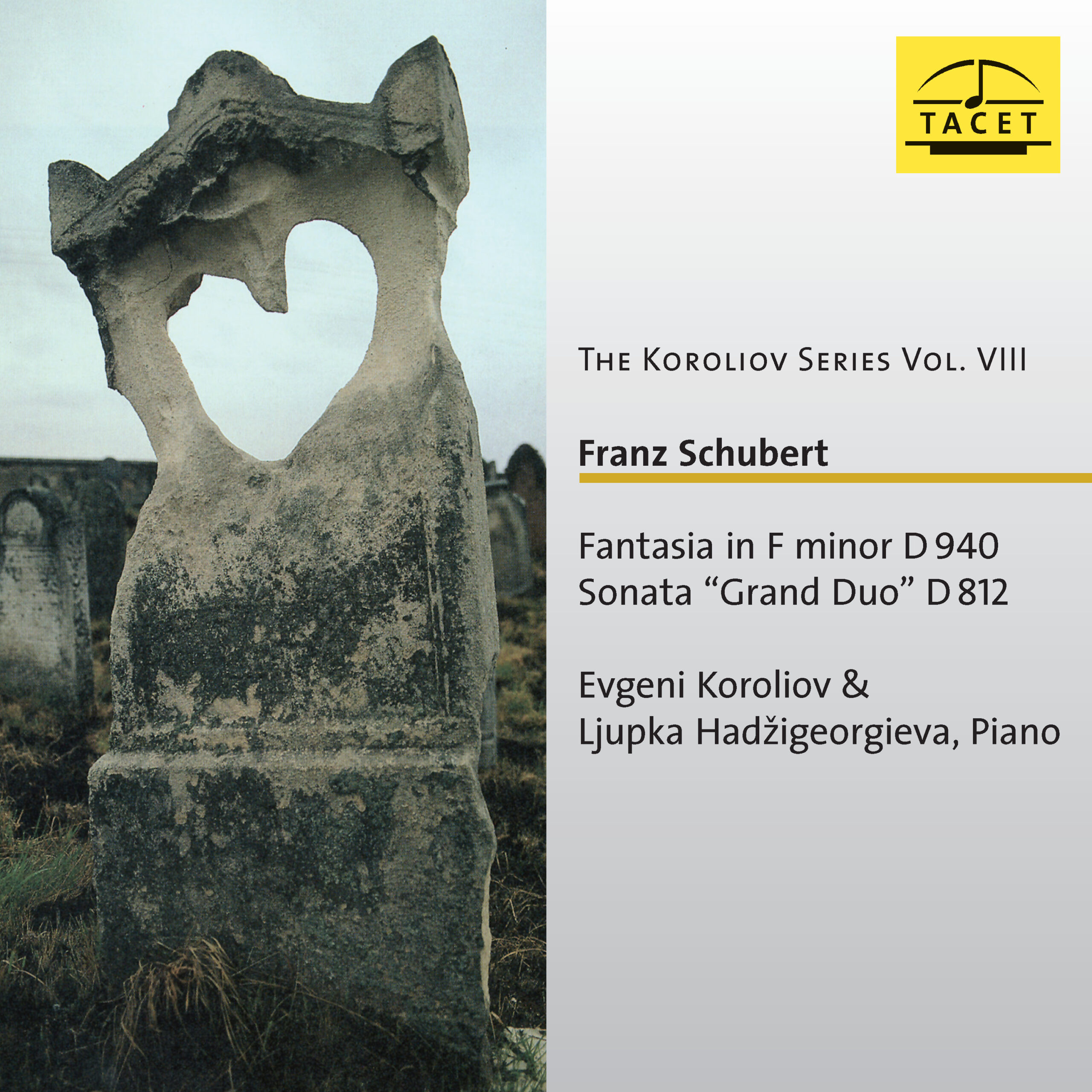
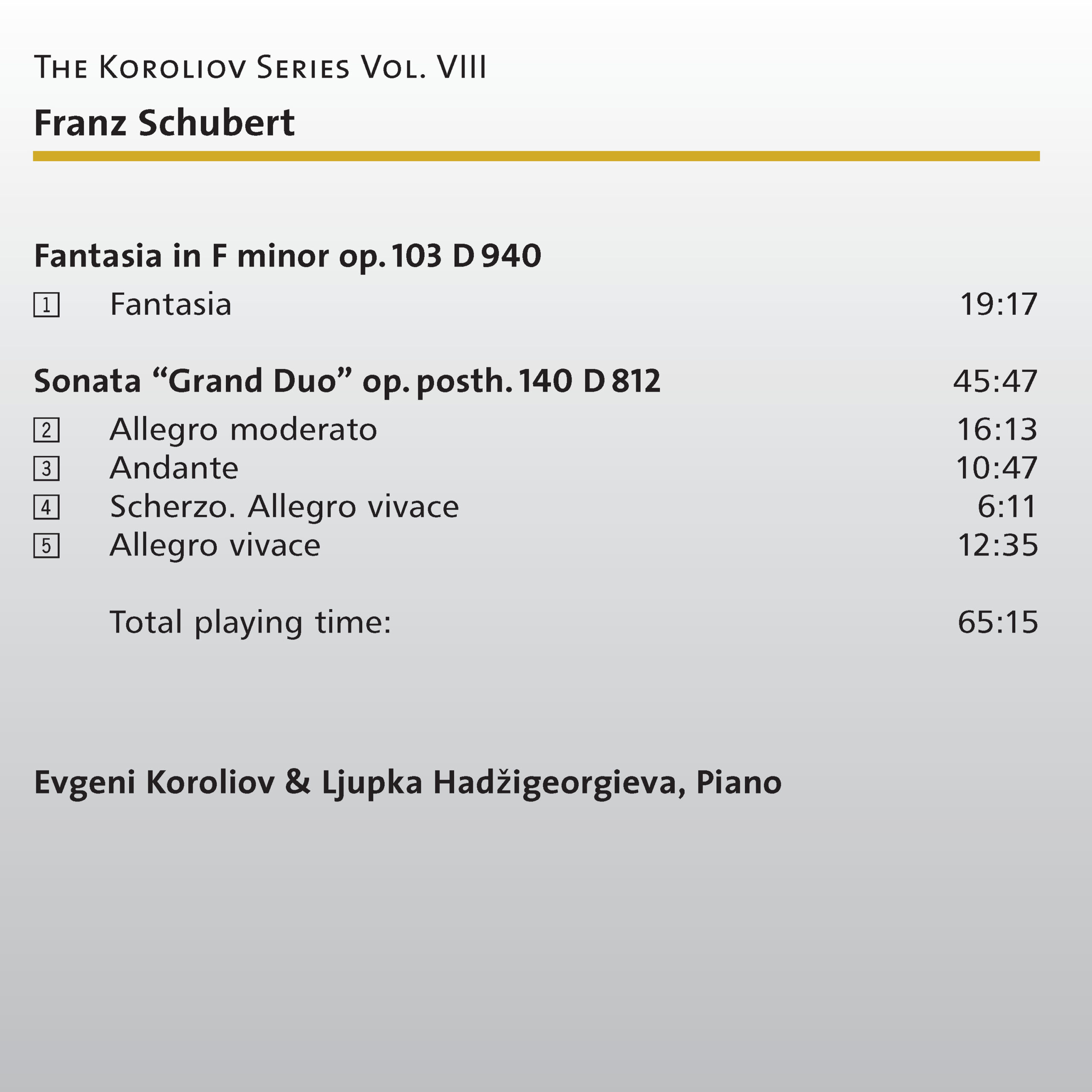


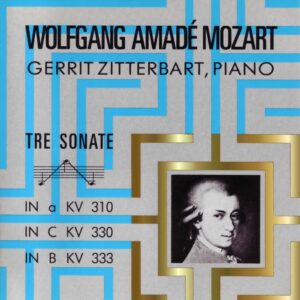
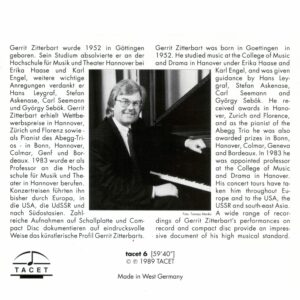
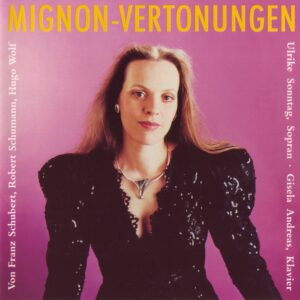
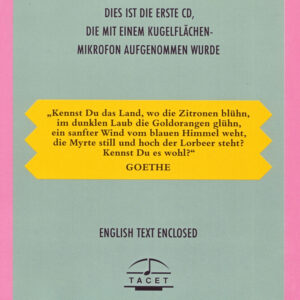

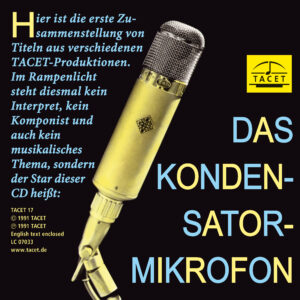
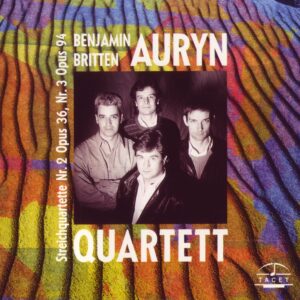
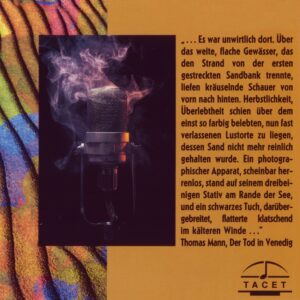
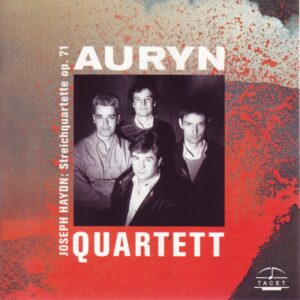
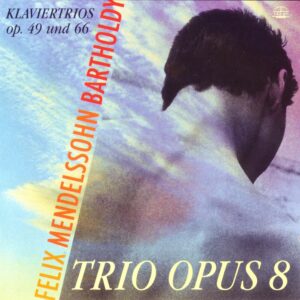
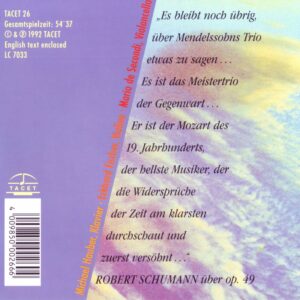
Platte 11 –
About twenty years ago, I attended a concert by Evgeni Koroliov. He performed at Schloss Ahaus. I no longer remember the program, but I’m fairly certain it included Classical-era piano music—a sonata by Haydn or Mozart. What I do recall is summarizing my impressions for a friend a few days later, saying something like: Koroliov played with incredible evenness, but also a little boringly.
That wasn’t a misjudgment. At 19 or 20, one is allowed to experience Evgeni Koroliov’s playing that way: too little rapture, too much control. And perhaps Koroliov really was tired that Sunday evening in Ahaus.
About ten years later, Koroliov’s first Bach recordings were released on CD. I wrote about his Well-Tempered Clavier, Book II (BWV 846–869): “Now Koroliov has recorded the second part, and once again, one listens in astonishment as he manages to combine absolute control with an inexplicable, soulful intensity. This is infinitely greater than Gould’s eccentricity.”
Two years ago, Tacet released a CD that didn’t seem to fit Koroliov’s previous discography—exclusively solo works—but did align with his biography: Koroliov in a piano duo with Ljupka Hadžigeorgieva. The Russian pianist and his Macedonian wife studied together at the Moscow Tchaikovsky Conservatory. Married for over 30 years, they have also performed as a piano duo in concerts (though not previously on recordings). On this CD, they play Schubert’s Fantasy in F minor, D. 940, and the Grand Duo Sonata in C major, D. 812.
Once again, that same “objective” approach to music stands out: no drastic tempo fluctuations, no exaggerated dynamic extremes (though they do take the opening of the Fantasy unusually softly), everything executed with care and precision. But does this mean the two artists are on the wrong path? Can Schubert be played as “objectively” as Bach? Doesn’t his Romantic music demand “personal expression”?
Koroliov and Hadžigeorgieva prove that another approach is possible—perhaps even necessary—for Schubert’s four-hand music: as clear, as pure, as unpretentious as this. Four-hand playing inherently involves a kind of objectification—two players must agree on tempo and dynamics, leaving less room for individual shaping or subjectivity. On the other hand, there’s the work’s dedication (“Dedicated to Countess Caroline Esterházy”) and its time of composition (Schubert’s final year, 1828), which might seem to invite a more dramatic, personal interpretation. It’s true that the F-minor Fantasy may echo unrequited love and failing health—but it also presents a more complex structure than Schubert’s other piano works, a polyphony and density that resist overly subjective readings. Schubert’s four-hand music is closer to his string quartets than to his solo piano works. And there’s another point in the duo’s favor: Schubert is said to have spent months on the F-minor Fantasy, constantly revising, refining, and expanding it. Nothing here was dashed off in a flash of genius. The recording reflects that: meticulously crafted in its regularity and balance. Koroliov and Hadžigeorgieva recede entirely into the background—allowing the music itself to emerge all the more vividly.
In any case, the F-minor Fantasy ranks among Schubert’s most beautiful works.
Heinz Gelking
Fanfare-Magazin –
Tacet has devoted a series to the excellent pianist Evgeny Koroliov (born in Moscow in 1949), issuing major sets devoted to Bach (Goldberg Variations, The Art of Fugue) and many other composers. The present disc, labeled Volume 8, includes his wife as partner in two of Schubert’s most glorious examples of music for piano four hands.
This is not my first encounter with Koroliov; I raved about his Schubert (the B♭ Sonata, D 960, and the Moments musicaux, D 780) in a 1995 volume of Fanfare (19:4), citing his “self-effacing musicianship and sensitivity.” Of course, there are two pianists to consider here, and it is impossible to distinguish the primo from the secundo without knowing which of them is playing which part—nor should one wish to! As one expects with any duo, the playing of the partners is blended, and with this husband-and-wife pair, the unity and smoothness of execution is faultless. A significant aid is the piano, which is uniform in sonority from bottom to top.
The two pianists offer a technically strong and consistently sensitive reading of the Fantasy, slipping convincingly from the exquisite melancholy of the opening section through the bright contrasting sections that follow, and finally back to the music of the opening. The "Grand Duo" is equally convincing in its contrasts between tumultuous drama and ineffable sweetness in the lengthy first movement. Koroliov and Hadžigeorgieva play brilliantly throughout, ever alert to the subtleties of Schubert’s affective changes in harmony and mood, and their performance leaves a powerful impression.
Inevitably one is brought back to the duo of Yaara Tal and Andreas Groethuysen, who recorded the complete Schubert four-hand repertoire on Sony in the 1990s in four volumes. Theirs was playing of rare perfection, enhanced by their choice of piano, the oversized Fazioli grand. (Their CDs are still available through various sellers on Amazon.) But I strongly recommend the Koroliov duo, especially to have these two great examples of Schubert’s art on one CD.
Susan Kagan
Le monde de la musique –
Among all the four-hand piano works Schubert composed at Zseliz Castle while in the service of Count Esterházy—as music teacher to his daughters Marie and Caroline—the Sonata "Grand Duo" stands out for its unusual dimensions. With a minimum of themes, Schubert crafts an elaborate harmonic journey.
It is an ambitious and strange work, indifferent to pleasing or moving its listeners, unfolding in a self-assured C major. The Fantasy in F minor also distinguishes itself, but for different reasons: its tonality immerses it in a morbid rapture, while its emotional depth transcends the conventional bounds of a "fantasy." Its thematic richness and the grandeur of its message elevate it to one of Schubert’s masterpieces.
The duo formed thirty years ago by the Moscow-born pianist Evgeny Koroliov and his wife Ljupka Hadžigeorgieva is utterly delightful. Renowned for his magnificent Bach recordings, Koroliov—now based in Hamburg—proves he also possesses a deep affinity for Schubert. The Grand Duo is superbly structured here, revealing an inner logic that often eludes listeners. With exquisite tenderness and evident intimacy, their performance of the F-minor Fantasy touches the soul’s deepest recesses without ever lapsing into showmanship.
Olivier Bellamy
____________________________
Original Review in French language:
Parmi toutes les oeuvres pour piano à quatre mains que Schubert à écrites au château de Zseliz, au service du comte Esterhazy, comme professeur de ses filles Marie et Caroline, la Sonate «Grand Duo» se distingue par ses dimensions inhabituelles. Avec un minimum de themes, Schubert trace un chemin harmonique élaboré.
C′est une oeuvre ambitieuse et étrange, peu soucieuse de plaire ou d′emouvoir, dans un ut majeur sûr de lui. La Fantaisie en fa mineur se détache aussi du lot, mais pour d′autres raisons. Sa tonalité la place dans une délectation mortifère tandis que son contenu émotionnel déborde le cadre de la «fantaisie». Sa richesse thématique et la grandeur de son message en font l′un des chefs-d′oeuvre de Schubert.
Le duo formé depuis trente ans par le pianiste moscovite Evgeny Koroliov et sa femme Ljupka Hadzigeorgieva est tout à fait réjouissant. Connu pour ses formidables enregistrements consacrés à Bach, Koroliov, qui vit à Hambourg, prouve qu′il possède aussi la fibre schubertienne. Superbement architecturé, le Grand Duo gagne ici une logique interne qui n′est pas toujours saisie par les auditeurs. Dans un jeu dune grande douceur et dune évidente intimité, la Fantaisie en fa mineur chatouille les replis les plus secrets de l′âme sans jamais tomber dans l′exhibition. “
Olivier Bellamy
Die Zeit –
Late masterpieces – Schubert’s swan songs
A precise thunderclap from four hands. Then a mental fermata. A grand pause. And now, near the end—almost like a fourth (sonata-form) movement of this wondrous Fantasy in F minor (D 940)—the piece regains its shape, gleaming with silvery brightness and deathly depth at once, as if engaged in a dialectical exercise. The atmosphere already evokes the mood of Schubert’s final piano sonatas—all three of them swan songs. Once more, Beethoven clenches his fist (C minor, D 958); once more, Vienna feels warm, radiant, sun-drenched. Then comes the close. In the slow movement of the B-flat Sonata (D 960), Death tiptoes through Schubert’s room as if it were eternity itself—and suddenly stops. "A fool I am, don’t you think?" Michael Stegemann has Schubert say to his friend Bauernfeld in his idiosyncratic book Ich bin am Ende mit allen Träumen—because Franz, the rapid scribe, had been tinkering with this Fantasy for four months. He revised the form repeatedly; by now, Schubert even trusted his own expansive lengths. And yet, as Stegemann rightly puts it, it was "devilish torment." In the end, the composer prefaced it with a brief line: "Dedicated to Countess Caroline Esterházy." Of course—an unattainable muse. Can’t you hear it?
Evgeny Koroliov and his wife Ljupka Hadžigeorgieva peer into Schubert’s bold constructions with such unflinching clarity that it can leave you breathless. Yet even the self-induced vertigo is masterfully caught by these four hands. And once again, Stuttgart’s sound engineer and producer Andreas Spreer lends his artists invaluable support. The Grand Duo in C major (D 812) from 1824—secretly dedicated to the Countess—is also plumbed to stunning sonic depths: Precisely where almost nothing seems to happen, in the unfolding of the first movement’s theme, the sound acquires a dimension you’d never have thought your speakers capable of. Here, time becomes space.
Mirko Weber
Klassik heute –
The Russian pianist Evgeny Koroliov, based in Hamburg, and his Macedonian duo partner (and wife) Ljupka Hadžigeorgieva have formed a piano duo since their student days at the Moscow Conservatory—one that, after hearing this Schubert recording, leaves the listener eager to experience them more often. Since Franz Schubert is considered one of the great masters of four-hand piano composition, his works in this genre have been recorded many times. Yet this interpretation offers far more than just another rendition of familiar repertoire. Instead, it emphasizes—even amid the dramatic contrasts, particularly in the Fantasy—a layer of lyrical timbres and contemplative tranquility. At the same time, the two musicians maintain a clear sense of direction in the formal structure, never indulging in misplaced ritardandos. The balance between late-Classical restraint and Romantic emotional richness is always preserved. Equally fascinating is how the Grand Duo presents its intricate, finely wrought piano texture with exemplary clarity, while still allowing the virtual symphonic dimension of this expansive work to emerge—even though it is now definitively established that this is not a disguised symphony (a fact that, however, does not diminish the value of Joseph Joachim’s 1855 orchestral arrangement).
Éva Pintér
Hessischer Rundfunk, CD-Tipp –
Long considered an insider’s tip, Evgeny Koroliov has cultivated an air of rarity that only heightens anticipation for his recordings.* The Russian pianist, who has taught as a piano professor at Hamburg’s Hochschule for years, is never easily satisfied—it takes time and considerable patience from producers before a new recording meets his exacting standards. Yet his 1990 debut on Tacet (Bach’s The Art of Fugue) was already a minor sensation, and for the Bach Year 2000, he delivered four outstanding new recordings.
Now, the persistence of Tacet producer Andreas Spreer has paid off: the "Koroliov Series" has grown to Volume 8—and once again, it’s something special. Apart from a few Eastern European radio and vinyl recordings, this marks Evgeny Koroliov’s first commercial duo recording with his wife, pianist Ljupka Hadžigeorgieva. The two have performed together since their student days in St. Petersburg 30 years ago and have won multiple awards as a duo. For their Tacet debut, they chose Schubert—the Sonata/"Grand Duo" in C major (D 812) and the Fantasy in F minor (D 940), both composed in the year of the composer’s death. Both works are linked to Schubert’s symphonic ambitions, featuring expansive orchestral structures and a dense web of voices and moods. Rendering this complexity at a single piano with four hands presents interpreters with considerable challenges.
Many piano duos opt for a dominant leading voice to lend brilliance and intensity—but not Koroliov and Hadžigeorgieva. With their customary seriousness and discipline, they uncover the orchestral framework and illuminate the polyphonic textures. Their piano sound lacks the harshness that sometimes plagues four-hand playing; instead, the Steinway grand sounds unusually soft and wonderfully warm, particularly at the opening of the Fantasy. Perhaps this Schubert interpretation, for all its intellectual depth, occasionally lacks spontaneous freshness—especially in the Sonata. Yet in return, the listener hears everything Schubert wrote—not all of it immediately perceptible, but the recording possesses a depth that is unmatched.
(...) This marks the first time the Koroliovs appear as a piano duo on record—a magnificent release that will further cement Koroliov’s legendary status. Alongside the F-minor Fantasy, the disc features the C-major Sonata (D 812), the so-called "Grand Duo", also for piano four hands.
Gisela Walther
NDR Kultur, Hörproben –
For 15 years, the music world has known Russian pianist Evgeny Koroliov as a brilliant Bach interpreter. He followed this with critically acclaimed recordings of Debussy and Schubert, setting new standards. Now, he steps into the spotlight alongside his wife, Ljupka Hadzigeorgieva. This debut comes late, as the two have already formed a well-rehearsed piano duo for 30 years. This is Koroliov’s trademark—he refines his interpretations over time. And rightly so, because despite high expectations, critics are unforgiving if the quality doesn’t remain consistently exceptional. Thus, the Koroliov/Hadzigeorgieva duo took their time, allowing their interpretations to mature before presenting Schubert’s four-hand works—the Fantasy in F minor, D. 940, and the "Grand Duo"—to the public. Antje Hinz has listened to the CD.
In his final year, 1828, Franz Schubert composed his Fantasy, Op. 103, for piano four hands, dedicating it to his piano student, Countess Caroline von Esterházy, whom he taught at Zseliz Castle. Schubert’s connection to her likely went far beyond a teacher-student relationship, but social barriers made an official romance impossible. This desperate situation is palpable in the Fantasy, particularly in the new recording by Evgeny Koroliov and Ljupka Hadzigeorgieva. The duo brings out the painful moments, emphasizing the work’s melancholic undertones. It’s no coincidence that Schubert wrote it in F minor, a key that music theorist Christian Schubart (also the lyricist for Schubert’s famous song "Die Forelle") described as expressing "deep sorrow, lamentation, wails of misery, and a longing for the grave." Koroliov and Hadzigeorgieva interpret the F-minor Fantasy as a bitter farewell to an unattainable love:
Their strongly biographical interpretation of the work is compelling. In comparison, the recently released live recordings by Evgeny Kissin and James Levine sound less intellectually penetrating. Kissin and Levine emphasize playfulness, taking faster tempos and using more legato, pushing the darker aspects into the background. Koroliov and Hadzigeorgieva, however, dissect the pieces, laying bare the tragic details—both in the Fantasy and in the Grand Duo in C major, D. 812, where Schubert paved the way for his symphonic ambitions.
Koroliov and Hadzigeorgieva pursue an ideal of faithfulness to the score. They play with purist precision, interpreting nothing beyond what the musical text and Schubert’s life story suggest. They clearly articulate each note, making it tangible how Schubert developed his movements from the smallest thematic fragments—through constant motivic transformations and derivations. Tacet, the label releasing these recordings, is known for its audiophile productions, and this CD meets all expectations in terms of presence and transparency. A recording that should not be missing from any Schubert collection.
Antje Hinz